Aged Care Nursing: Principles of Nursing Management in Gerontology
VerifiedAdded on 2023/06/11
|14
|3101
|143
Report
AI Summary
This report discusses the principles of nursing management for older adults requiring aged care, also known as gerontology nursing. It highlights the purpose of aged care nursing in addressing the physiological changes and chronic conditions associated with aging. The literature review traces the evolution of aged care facilities from poorhouses to modern nursing homes. Key principles of nursing management are detailed, including person-centered care, health education, protecting client’s rights, strategic crisis intervention, liaison with family, ethical considerations, and proper care for treatable conditions. The report emphasizes the importance of understanding aging as a unique process, advocating for client rights, and providing holistic care that addresses both physical and emotional needs while ensuring ethical and legal considerations, especially concerning end-of-life decisions.
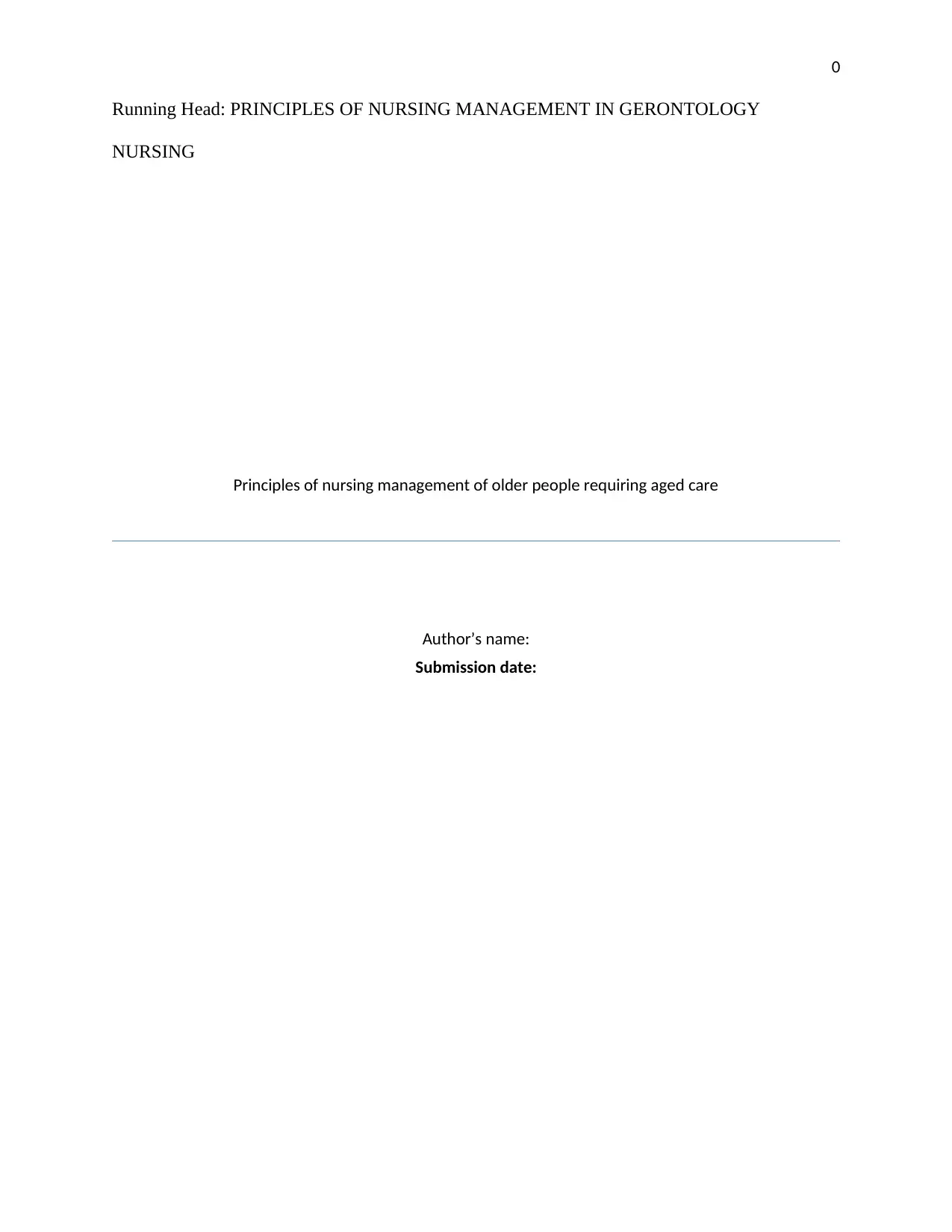
0
Running Head: PRINCIPLES OF NURSING MANAGEMENT IN GERONTOLOGY
NURSING
Principles of nursing management of older people requiring aged care
Author’s name:
Submission date:
Running Head: PRINCIPLES OF NURSING MANAGEMENT IN GERONTOLOGY
NURSING
Principles of nursing management of older people requiring aged care
Author’s name:
Submission date:
Paraphrase This Document
Need a fresh take? Get an instant paraphrase of this document with our AI Paraphraser
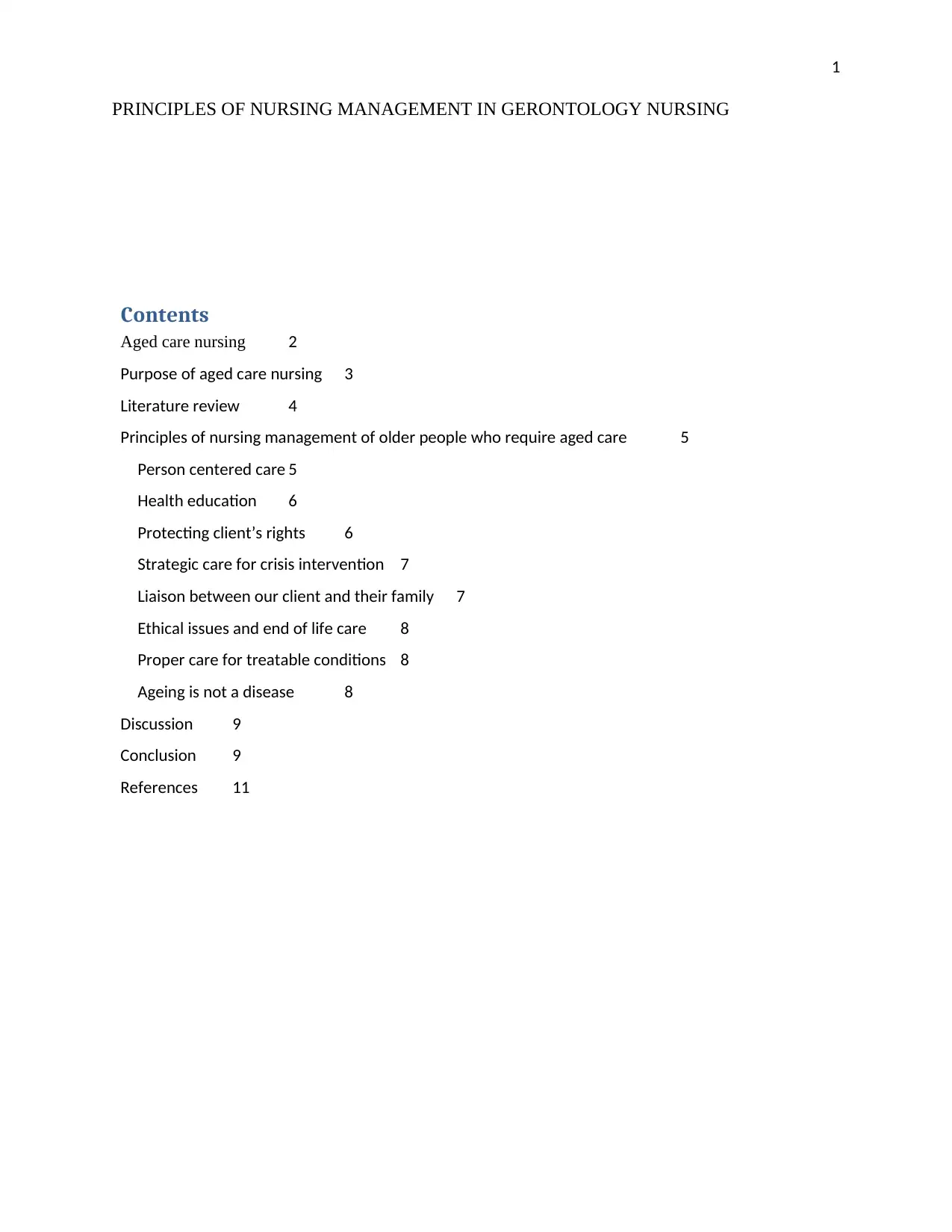
1
PRINCIPLES OF NURSING MANAGEMENT IN GERONTOLOGY NURSING
Contents
Aged care nursing 2
Purpose of aged care nursing 3
Literature review 4
Principles of nursing management of older people who require aged care 5
Person centered care 5
Health education 6
Protecting client’s rights 6
Strategic care for crisis intervention 7
Liaison between our client and their family 7
Ethical issues and end of life care 8
Proper care for treatable conditions 8
Ageing is not a disease 8
Discussion 9
Conclusion 9
References 11
PRINCIPLES OF NURSING MANAGEMENT IN GERONTOLOGY NURSING
Contents
Aged care nursing 2
Purpose of aged care nursing 3
Literature review 4
Principles of nursing management of older people who require aged care 5
Person centered care 5
Health education 6
Protecting client’s rights 6
Strategic care for crisis intervention 7
Liaison between our client and their family 7
Ethical issues and end of life care 8
Proper care for treatable conditions 8
Ageing is not a disease 8
Discussion 9
Conclusion 9
References 11
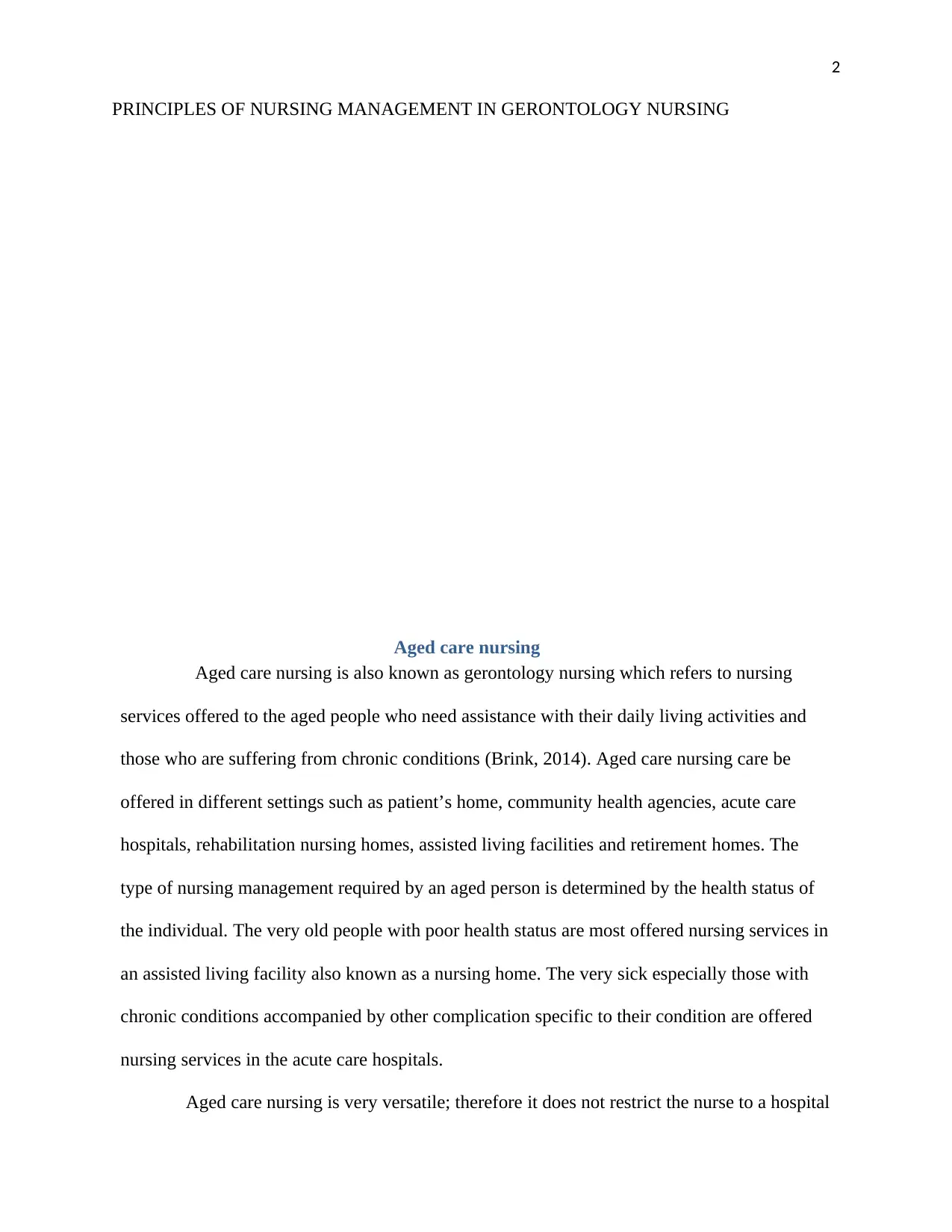
2
PRINCIPLES OF NURSING MANAGEMENT IN GERONTOLOGY NURSING
Aged care nursing
Aged care nursing is also known as gerontology nursing which refers to nursing
services offered to the aged people who need assistance with their daily living activities and
those who are suffering from chronic conditions (Brink, 2014). Aged care nursing care be
offered in different settings such as patient’s home, community health agencies, acute care
hospitals, rehabilitation nursing homes, assisted living facilities and retirement homes. The
type of nursing management required by an aged person is determined by the health status of
the individual. The very old people with poor health status are most offered nursing services in
an assisted living facility also known as a nursing home. The very sick especially those with
chronic conditions accompanied by other complication specific to their condition are offered
nursing services in the acute care hospitals.
Aged care nursing is very versatile; therefore it does not restrict the nurse to a hospital
PRINCIPLES OF NURSING MANAGEMENT IN GERONTOLOGY NURSING
Aged care nursing
Aged care nursing is also known as gerontology nursing which refers to nursing
services offered to the aged people who need assistance with their daily living activities and
those who are suffering from chronic conditions (Brink, 2014). Aged care nursing care be
offered in different settings such as patient’s home, community health agencies, acute care
hospitals, rehabilitation nursing homes, assisted living facilities and retirement homes. The
type of nursing management required by an aged person is determined by the health status of
the individual. The very old people with poor health status are most offered nursing services in
an assisted living facility also known as a nursing home. The very sick especially those with
chronic conditions accompanied by other complication specific to their condition are offered
nursing services in the acute care hospitals.
Aged care nursing is very versatile; therefore it does not restrict the nurse to a hospital
⊘ This is a preview!⊘
Do you want full access?
Subscribe today to unlock all pages.

Trusted by 1+ million students worldwide
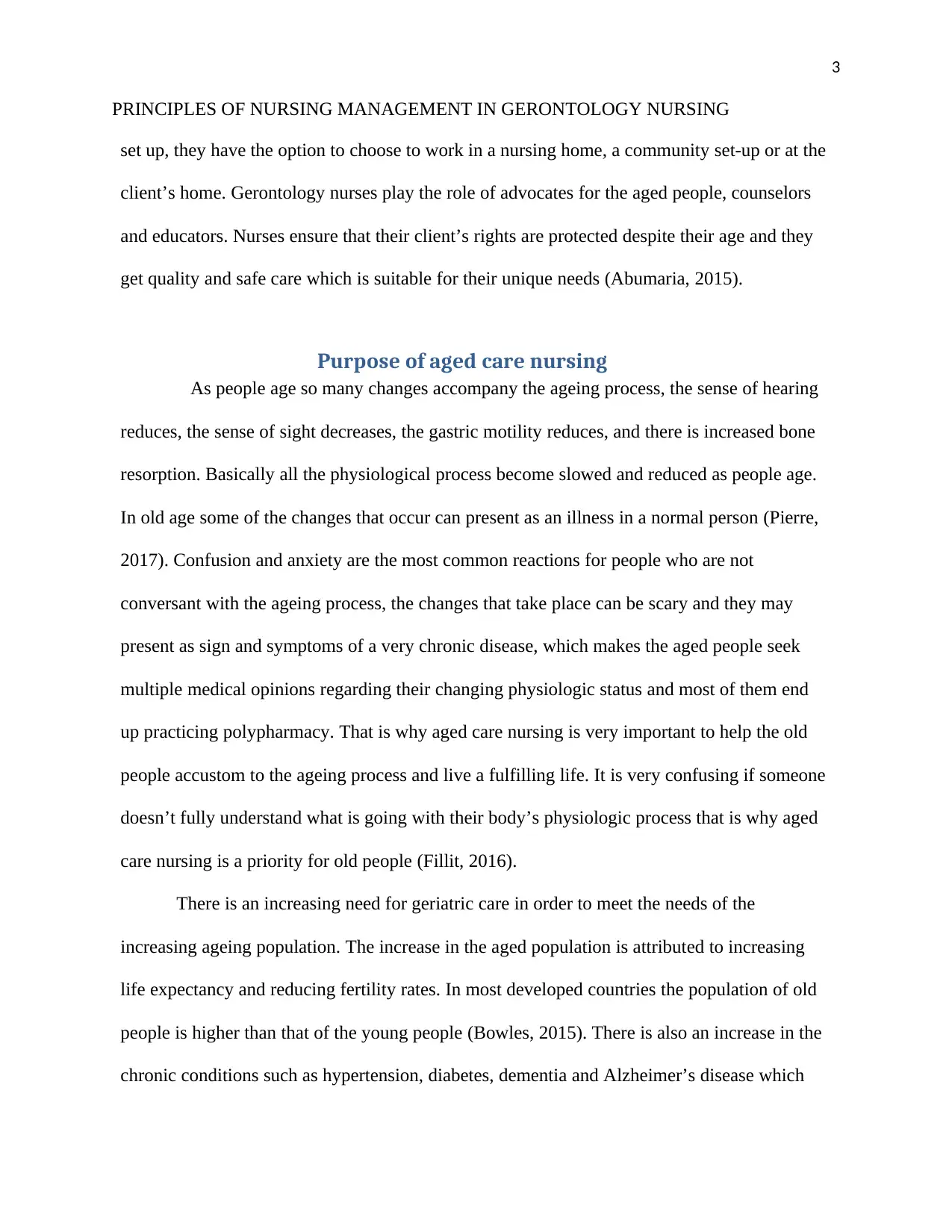
3
PRINCIPLES OF NURSING MANAGEMENT IN GERONTOLOGY NURSING
set up, they have the option to choose to work in a nursing home, a community set-up or at the
client’s home. Gerontology nurses play the role of advocates for the aged people, counselors
and educators. Nurses ensure that their client’s rights are protected despite their age and they
get quality and safe care which is suitable for their unique needs (Abumaria, 2015).
Purpose of aged care nursing
As people age so many changes accompany the ageing process, the sense of hearing
reduces, the sense of sight decreases, the gastric motility reduces, and there is increased bone
resorption. Basically all the physiological process become slowed and reduced as people age.
In old age some of the changes that occur can present as an illness in a normal person (Pierre,
2017). Confusion and anxiety are the most common reactions for people who are not
conversant with the ageing process, the changes that take place can be scary and they may
present as sign and symptoms of a very chronic disease, which makes the aged people seek
multiple medical opinions regarding their changing physiologic status and most of them end
up practicing polypharmacy. That is why aged care nursing is very important to help the old
people accustom to the ageing process and live a fulfilling life. It is very confusing if someone
doesn’t fully understand what is going with their body’s physiologic process that is why aged
care nursing is a priority for old people (Fillit, 2016).
There is an increasing need for geriatric care in order to meet the needs of the
increasing ageing population. The increase in the aged population is attributed to increasing
life expectancy and reducing fertility rates. In most developed countries the population of old
people is higher than that of the young people (Bowles, 2015). There is also an increase in the
chronic conditions such as hypertension, diabetes, dementia and Alzheimer’s disease which
PRINCIPLES OF NURSING MANAGEMENT IN GERONTOLOGY NURSING
set up, they have the option to choose to work in a nursing home, a community set-up or at the
client’s home. Gerontology nurses play the role of advocates for the aged people, counselors
and educators. Nurses ensure that their client’s rights are protected despite their age and they
get quality and safe care which is suitable for their unique needs (Abumaria, 2015).
Purpose of aged care nursing
As people age so many changes accompany the ageing process, the sense of hearing
reduces, the sense of sight decreases, the gastric motility reduces, and there is increased bone
resorption. Basically all the physiological process become slowed and reduced as people age.
In old age some of the changes that occur can present as an illness in a normal person (Pierre,
2017). Confusion and anxiety are the most common reactions for people who are not
conversant with the ageing process, the changes that take place can be scary and they may
present as sign and symptoms of a very chronic disease, which makes the aged people seek
multiple medical opinions regarding their changing physiologic status and most of them end
up practicing polypharmacy. That is why aged care nursing is very important to help the old
people accustom to the ageing process and live a fulfilling life. It is very confusing if someone
doesn’t fully understand what is going with their body’s physiologic process that is why aged
care nursing is a priority for old people (Fillit, 2016).
There is an increasing need for geriatric care in order to meet the needs of the
increasing ageing population. The increase in the aged population is attributed to increasing
life expectancy and reducing fertility rates. In most developed countries the population of old
people is higher than that of the young people (Bowles, 2015). There is also an increase in the
chronic conditions such as hypertension, diabetes, dementia and Alzheimer’s disease which
Paraphrase This Document
Need a fresh take? Get an instant paraphrase of this document with our AI Paraphraser
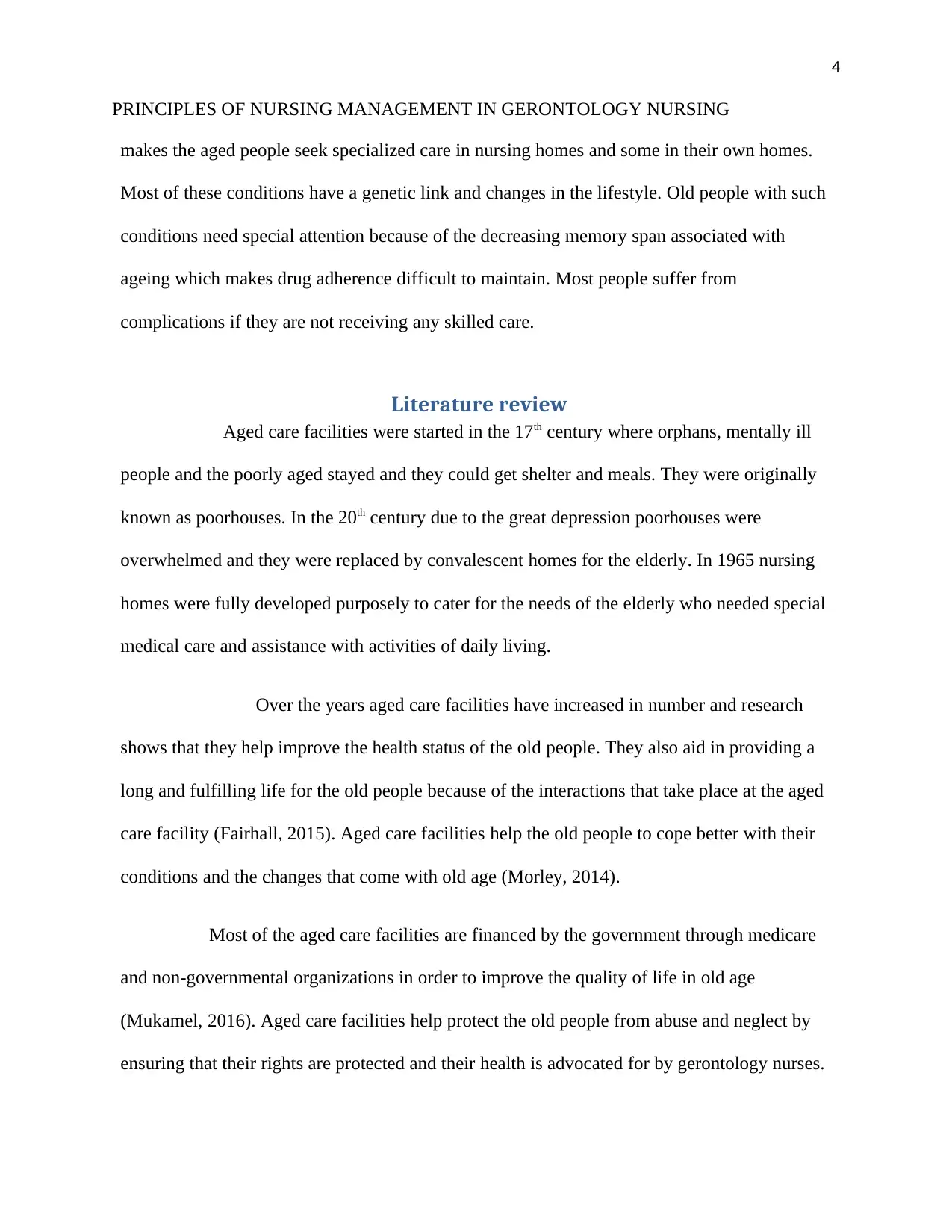
4
PRINCIPLES OF NURSING MANAGEMENT IN GERONTOLOGY NURSING
makes the aged people seek specialized care in nursing homes and some in their own homes.
Most of these conditions have a genetic link and changes in the lifestyle. Old people with such
conditions need special attention because of the decreasing memory span associated with
ageing which makes drug adherence difficult to maintain. Most people suffer from
complications if they are not receiving any skilled care.
Literature review
Aged care facilities were started in the 17th century where orphans, mentally ill
people and the poorly aged stayed and they could get shelter and meals. They were originally
known as poorhouses. In the 20th century due to the great depression poorhouses were
overwhelmed and they were replaced by convalescent homes for the elderly. In 1965 nursing
homes were fully developed purposely to cater for the needs of the elderly who needed special
medical care and assistance with activities of daily living.
Over the years aged care facilities have increased in number and research
shows that they help improve the health status of the old people. They also aid in providing a
long and fulfilling life for the old people because of the interactions that take place at the aged
care facility (Fairhall, 2015). Aged care facilities help the old people to cope better with their
conditions and the changes that come with old age (Morley, 2014).
Most of the aged care facilities are financed by the government through medicare
and non-governmental organizations in order to improve the quality of life in old age
(Mukamel, 2016). Aged care facilities help protect the old people from abuse and neglect by
ensuring that their rights are protected and their health is advocated for by gerontology nurses.
PRINCIPLES OF NURSING MANAGEMENT IN GERONTOLOGY NURSING
makes the aged people seek specialized care in nursing homes and some in their own homes.
Most of these conditions have a genetic link and changes in the lifestyle. Old people with such
conditions need special attention because of the decreasing memory span associated with
ageing which makes drug adherence difficult to maintain. Most people suffer from
complications if they are not receiving any skilled care.
Literature review
Aged care facilities were started in the 17th century where orphans, mentally ill
people and the poorly aged stayed and they could get shelter and meals. They were originally
known as poorhouses. In the 20th century due to the great depression poorhouses were
overwhelmed and they were replaced by convalescent homes for the elderly. In 1965 nursing
homes were fully developed purposely to cater for the needs of the elderly who needed special
medical care and assistance with activities of daily living.
Over the years aged care facilities have increased in number and research
shows that they help improve the health status of the old people. They also aid in providing a
long and fulfilling life for the old people because of the interactions that take place at the aged
care facility (Fairhall, 2015). Aged care facilities help the old people to cope better with their
conditions and the changes that come with old age (Morley, 2014).
Most of the aged care facilities are financed by the government through medicare
and non-governmental organizations in order to improve the quality of life in old age
(Mukamel, 2016). Aged care facilities help protect the old people from abuse and neglect by
ensuring that their rights are protected and their health is advocated for by gerontology nurses.
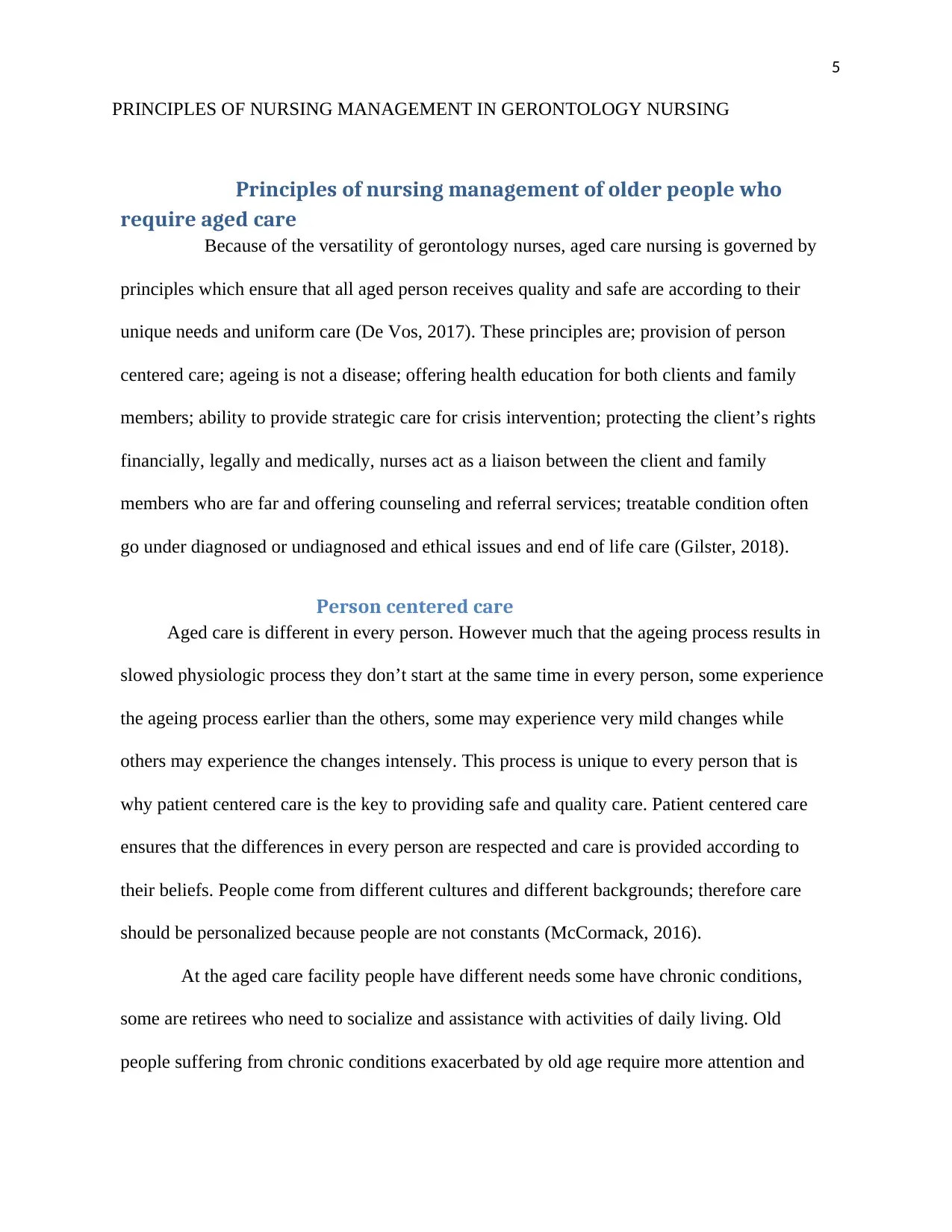
5
PRINCIPLES OF NURSING MANAGEMENT IN GERONTOLOGY NURSING
Principles of nursing management of older people who
require aged care
Because of the versatility of gerontology nurses, aged care nursing is governed by
principles which ensure that all aged person receives quality and safe are according to their
unique needs and uniform care (De Vos, 2017). These principles are; provision of person
centered care; ageing is not a disease; offering health education for both clients and family
members; ability to provide strategic care for crisis intervention; protecting the client’s rights
financially, legally and medically, nurses act as a liaison between the client and family
members who are far and offering counseling and referral services; treatable condition often
go under diagnosed or undiagnosed and ethical issues and end of life care (Gilster, 2018).
Person centered care
Aged care is different in every person. However much that the ageing process results in
slowed physiologic process they don’t start at the same time in every person, some experience
the ageing process earlier than the others, some may experience very mild changes while
others may experience the changes intensely. This process is unique to every person that is
why patient centered care is the key to providing safe and quality care. Patient centered care
ensures that the differences in every person are respected and care is provided according to
their beliefs. People come from different cultures and different backgrounds; therefore care
should be personalized because people are not constants (McCormack, 2016).
At the aged care facility people have different needs some have chronic conditions,
some are retirees who need to socialize and assistance with activities of daily living. Old
people suffering from chronic conditions exacerbated by old age require more attention and
PRINCIPLES OF NURSING MANAGEMENT IN GERONTOLOGY NURSING
Principles of nursing management of older people who
require aged care
Because of the versatility of gerontology nurses, aged care nursing is governed by
principles which ensure that all aged person receives quality and safe are according to their
unique needs and uniform care (De Vos, 2017). These principles are; provision of person
centered care; ageing is not a disease; offering health education for both clients and family
members; ability to provide strategic care for crisis intervention; protecting the client’s rights
financially, legally and medically, nurses act as a liaison between the client and family
members who are far and offering counseling and referral services; treatable condition often
go under diagnosed or undiagnosed and ethical issues and end of life care (Gilster, 2018).
Person centered care
Aged care is different in every person. However much that the ageing process results in
slowed physiologic process they don’t start at the same time in every person, some experience
the ageing process earlier than the others, some may experience very mild changes while
others may experience the changes intensely. This process is unique to every person that is
why patient centered care is the key to providing safe and quality care. Patient centered care
ensures that the differences in every person are respected and care is provided according to
their beliefs. People come from different cultures and different backgrounds; therefore care
should be personalized because people are not constants (McCormack, 2016).
At the aged care facility people have different needs some have chronic conditions,
some are retirees who need to socialize and assistance with activities of daily living. Old
people suffering from chronic conditions exacerbated by old age require more attention and
⊘ This is a preview!⊘
Do you want full access?
Subscribe today to unlock all pages.

Trusted by 1+ million students worldwide
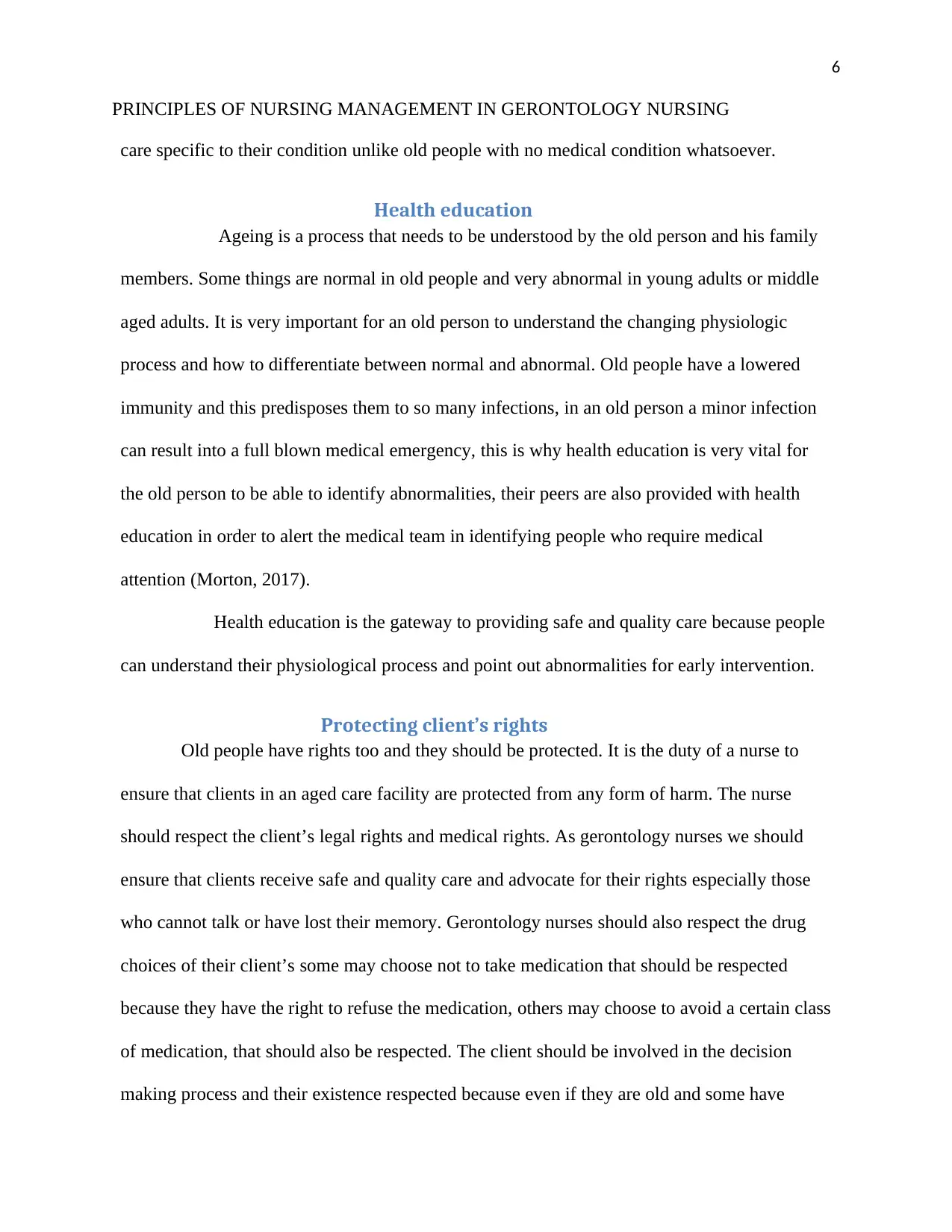
6
PRINCIPLES OF NURSING MANAGEMENT IN GERONTOLOGY NURSING
care specific to their condition unlike old people with no medical condition whatsoever.
Health education
Ageing is a process that needs to be understood by the old person and his family
members. Some things are normal in old people and very abnormal in young adults or middle
aged adults. It is very important for an old person to understand the changing physiologic
process and how to differentiate between normal and abnormal. Old people have a lowered
immunity and this predisposes them to so many infections, in an old person a minor infection
can result into a full blown medical emergency, this is why health education is very vital for
the old person to be able to identify abnormalities, their peers are also provided with health
education in order to alert the medical team in identifying people who require medical
attention (Morton, 2017).
Health education is the gateway to providing safe and quality care because people
can understand their physiological process and point out abnormalities for early intervention.
Protecting client’s rights
Old people have rights too and they should be protected. It is the duty of a nurse to
ensure that clients in an aged care facility are protected from any form of harm. The nurse
should respect the client’s legal rights and medical rights. As gerontology nurses we should
ensure that clients receive safe and quality care and advocate for their rights especially those
who cannot talk or have lost their memory. Gerontology nurses should also respect the drug
choices of their client’s some may choose not to take medication that should be respected
because they have the right to refuse the medication, others may choose to avoid a certain class
of medication, that should also be respected. The client should be involved in the decision
making process and their existence respected because even if they are old and some have
PRINCIPLES OF NURSING MANAGEMENT IN GERONTOLOGY NURSING
care specific to their condition unlike old people with no medical condition whatsoever.
Health education
Ageing is a process that needs to be understood by the old person and his family
members. Some things are normal in old people and very abnormal in young adults or middle
aged adults. It is very important for an old person to understand the changing physiologic
process and how to differentiate between normal and abnormal. Old people have a lowered
immunity and this predisposes them to so many infections, in an old person a minor infection
can result into a full blown medical emergency, this is why health education is very vital for
the old person to be able to identify abnormalities, their peers are also provided with health
education in order to alert the medical team in identifying people who require medical
attention (Morton, 2017).
Health education is the gateway to providing safe and quality care because people
can understand their physiological process and point out abnormalities for early intervention.
Protecting client’s rights
Old people have rights too and they should be protected. It is the duty of a nurse to
ensure that clients in an aged care facility are protected from any form of harm. The nurse
should respect the client’s legal rights and medical rights. As gerontology nurses we should
ensure that clients receive safe and quality care and advocate for their rights especially those
who cannot talk or have lost their memory. Gerontology nurses should also respect the drug
choices of their client’s some may choose not to take medication that should be respected
because they have the right to refuse the medication, others may choose to avoid a certain class
of medication, that should also be respected. The client should be involved in the decision
making process and their existence respected because even if they are old and some have
Paraphrase This Document
Need a fresh take? Get an instant paraphrase of this document with our AI Paraphraser
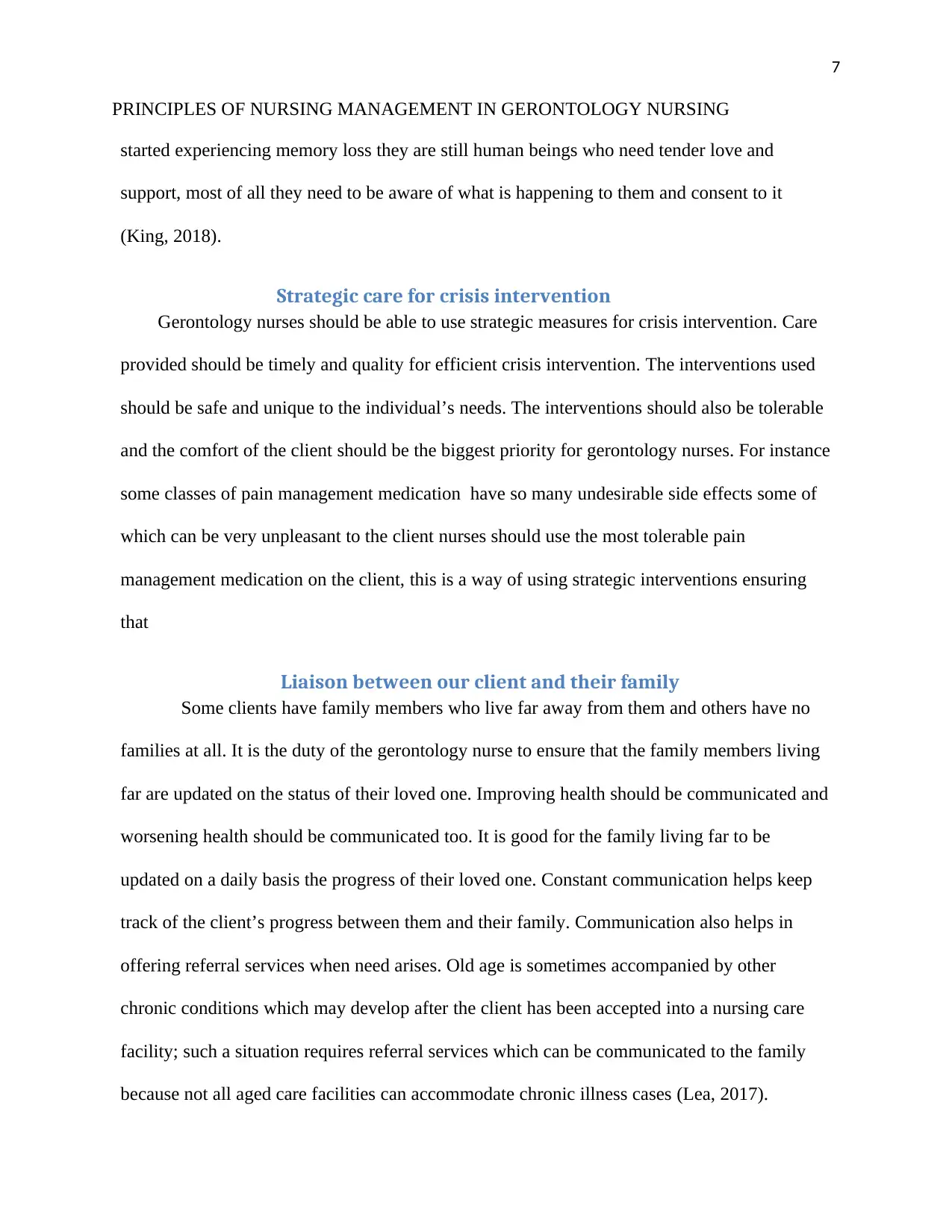
7
PRINCIPLES OF NURSING MANAGEMENT IN GERONTOLOGY NURSING
started experiencing memory loss they are still human beings who need tender love and
support, most of all they need to be aware of what is happening to them and consent to it
(King, 2018).
Strategic care for crisis intervention
Gerontology nurses should be able to use strategic measures for crisis intervention. Care
provided should be timely and quality for efficient crisis intervention. The interventions used
should be safe and unique to the individual’s needs. The interventions should also be tolerable
and the comfort of the client should be the biggest priority for gerontology nurses. For instance
some classes of pain management medication have so many undesirable side effects some of
which can be very unpleasant to the client nurses should use the most tolerable pain
management medication on the client, this is a way of using strategic interventions ensuring
that
Liaison between our client and their family
Some clients have family members who live far away from them and others have no
families at all. It is the duty of the gerontology nurse to ensure that the family members living
far are updated on the status of their loved one. Improving health should be communicated and
worsening health should be communicated too. It is good for the family living far to be
updated on a daily basis the progress of their loved one. Constant communication helps keep
track of the client’s progress between them and their family. Communication also helps in
offering referral services when need arises. Old age is sometimes accompanied by other
chronic conditions which may develop after the client has been accepted into a nursing care
facility; such a situation requires referral services which can be communicated to the family
because not all aged care facilities can accommodate chronic illness cases (Lea, 2017).
PRINCIPLES OF NURSING MANAGEMENT IN GERONTOLOGY NURSING
started experiencing memory loss they are still human beings who need tender love and
support, most of all they need to be aware of what is happening to them and consent to it
(King, 2018).
Strategic care for crisis intervention
Gerontology nurses should be able to use strategic measures for crisis intervention. Care
provided should be timely and quality for efficient crisis intervention. The interventions used
should be safe and unique to the individual’s needs. The interventions should also be tolerable
and the comfort of the client should be the biggest priority for gerontology nurses. For instance
some classes of pain management medication have so many undesirable side effects some of
which can be very unpleasant to the client nurses should use the most tolerable pain
management medication on the client, this is a way of using strategic interventions ensuring
that
Liaison between our client and their family
Some clients have family members who live far away from them and others have no
families at all. It is the duty of the gerontology nurse to ensure that the family members living
far are updated on the status of their loved one. Improving health should be communicated and
worsening health should be communicated too. It is good for the family living far to be
updated on a daily basis the progress of their loved one. Constant communication helps keep
track of the client’s progress between them and their family. Communication also helps in
offering referral services when need arises. Old age is sometimes accompanied by other
chronic conditions which may develop after the client has been accepted into a nursing care
facility; such a situation requires referral services which can be communicated to the family
because not all aged care facilities can accommodate chronic illness cases (Lea, 2017).
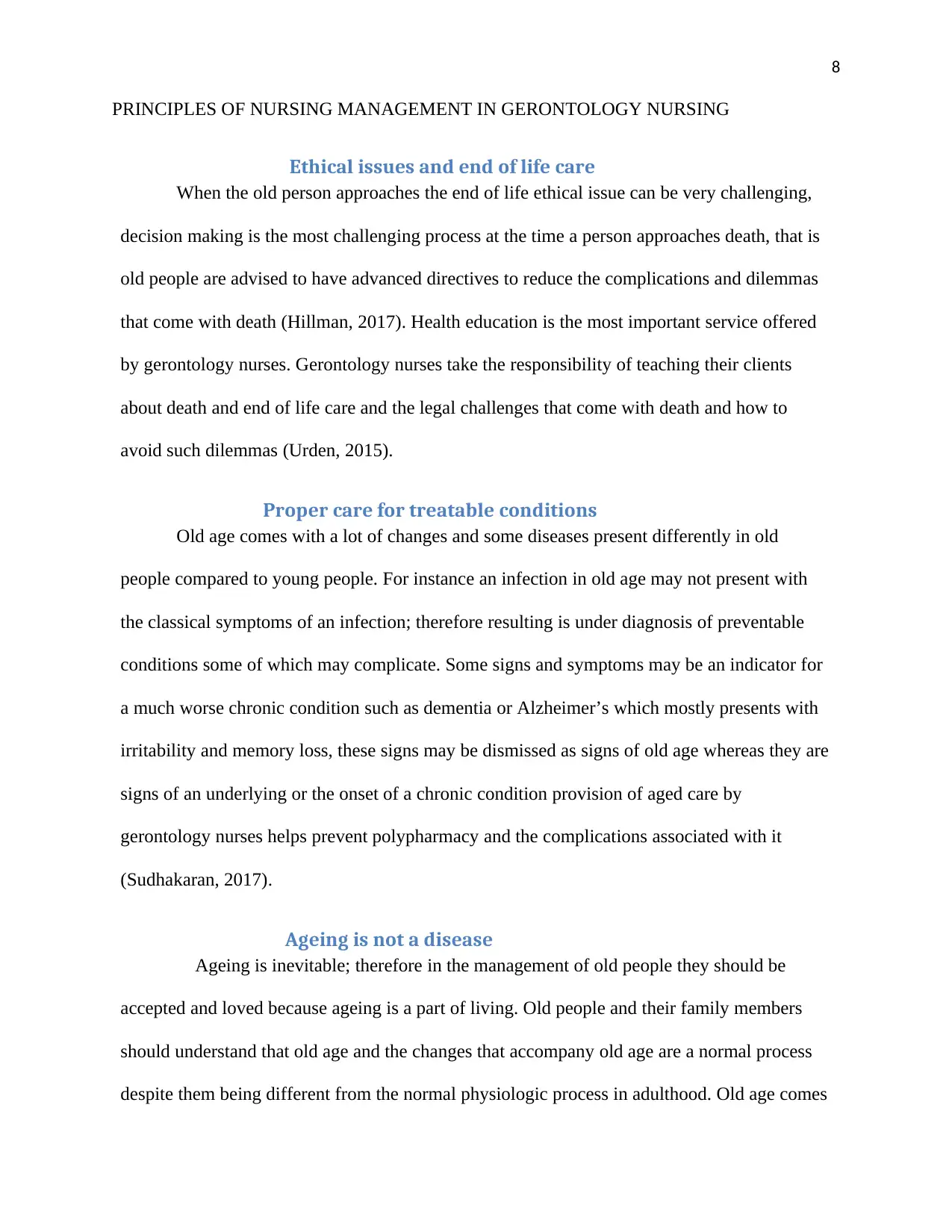
8
PRINCIPLES OF NURSING MANAGEMENT IN GERONTOLOGY NURSING
Ethical issues and end of life care
When the old person approaches the end of life ethical issue can be very challenging,
decision making is the most challenging process at the time a person approaches death, that is
old people are advised to have advanced directives to reduce the complications and dilemmas
that come with death (Hillman, 2017). Health education is the most important service offered
by gerontology nurses. Gerontology nurses take the responsibility of teaching their clients
about death and end of life care and the legal challenges that come with death and how to
avoid such dilemmas (Urden, 2015).
Proper care for treatable conditions
Old age comes with a lot of changes and some diseases present differently in old
people compared to young people. For instance an infection in old age may not present with
the classical symptoms of an infection; therefore resulting is under diagnosis of preventable
conditions some of which may complicate. Some signs and symptoms may be an indicator for
a much worse chronic condition such as dementia or Alzheimer’s which mostly presents with
irritability and memory loss, these signs may be dismissed as signs of old age whereas they are
signs of an underlying or the onset of a chronic condition provision of aged care by
gerontology nurses helps prevent polypharmacy and the complications associated with it
(Sudhakaran, 2017).
Ageing is not a disease
Ageing is inevitable; therefore in the management of old people they should be
accepted and loved because ageing is a part of living. Old people and their family members
should understand that old age and the changes that accompany old age are a normal process
despite them being different from the normal physiologic process in adulthood. Old age comes
PRINCIPLES OF NURSING MANAGEMENT IN GERONTOLOGY NURSING
Ethical issues and end of life care
When the old person approaches the end of life ethical issue can be very challenging,
decision making is the most challenging process at the time a person approaches death, that is
old people are advised to have advanced directives to reduce the complications and dilemmas
that come with death (Hillman, 2017). Health education is the most important service offered
by gerontology nurses. Gerontology nurses take the responsibility of teaching their clients
about death and end of life care and the legal challenges that come with death and how to
avoid such dilemmas (Urden, 2015).
Proper care for treatable conditions
Old age comes with a lot of changes and some diseases present differently in old
people compared to young people. For instance an infection in old age may not present with
the classical symptoms of an infection; therefore resulting is under diagnosis of preventable
conditions some of which may complicate. Some signs and symptoms may be an indicator for
a much worse chronic condition such as dementia or Alzheimer’s which mostly presents with
irritability and memory loss, these signs may be dismissed as signs of old age whereas they are
signs of an underlying or the onset of a chronic condition provision of aged care by
gerontology nurses helps prevent polypharmacy and the complications associated with it
(Sudhakaran, 2017).
Ageing is not a disease
Ageing is inevitable; therefore in the management of old people they should be
accepted and loved because ageing is a part of living. Old people and their family members
should understand that old age and the changes that accompany old age are a normal process
despite them being different from the normal physiologic process in adulthood. Old age comes
⊘ This is a preview!⊘
Do you want full access?
Subscribe today to unlock all pages.

Trusted by 1+ million students worldwide
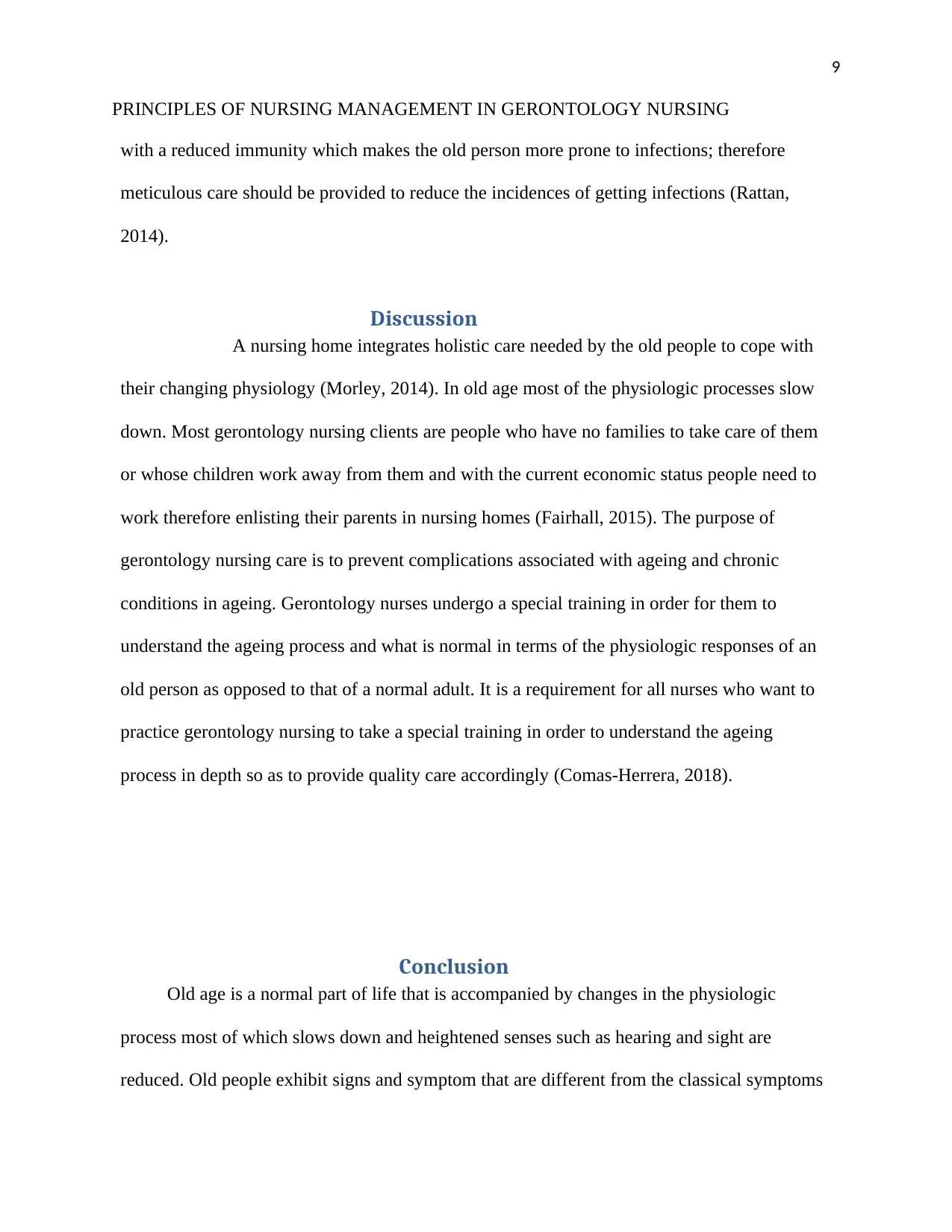
9
PRINCIPLES OF NURSING MANAGEMENT IN GERONTOLOGY NURSING
with a reduced immunity which makes the old person more prone to infections; therefore
meticulous care should be provided to reduce the incidences of getting infections (Rattan,
2014).
Discussion
A nursing home integrates holistic care needed by the old people to cope with
their changing physiology (Morley, 2014). In old age most of the physiologic processes slow
down. Most gerontology nursing clients are people who have no families to take care of them
or whose children work away from them and with the current economic status people need to
work therefore enlisting their parents in nursing homes (Fairhall, 2015). The purpose of
gerontology nursing care is to prevent complications associated with ageing and chronic
conditions in ageing. Gerontology nurses undergo a special training in order for them to
understand the ageing process and what is normal in terms of the physiologic responses of an
old person as opposed to that of a normal adult. It is a requirement for all nurses who want to
practice gerontology nursing to take a special training in order to understand the ageing
process in depth so as to provide quality care accordingly (Comas-Herrera, 2018).
Conclusion
Old age is a normal part of life that is accompanied by changes in the physiologic
process most of which slows down and heightened senses such as hearing and sight are
reduced. Old people exhibit signs and symptom that are different from the classical symptoms
PRINCIPLES OF NURSING MANAGEMENT IN GERONTOLOGY NURSING
with a reduced immunity which makes the old person more prone to infections; therefore
meticulous care should be provided to reduce the incidences of getting infections (Rattan,
2014).
Discussion
A nursing home integrates holistic care needed by the old people to cope with
their changing physiology (Morley, 2014). In old age most of the physiologic processes slow
down. Most gerontology nursing clients are people who have no families to take care of them
or whose children work away from them and with the current economic status people need to
work therefore enlisting their parents in nursing homes (Fairhall, 2015). The purpose of
gerontology nursing care is to prevent complications associated with ageing and chronic
conditions in ageing. Gerontology nurses undergo a special training in order for them to
understand the ageing process and what is normal in terms of the physiologic responses of an
old person as opposed to that of a normal adult. It is a requirement for all nurses who want to
practice gerontology nursing to take a special training in order to understand the ageing
process in depth so as to provide quality care accordingly (Comas-Herrera, 2018).
Conclusion
Old age is a normal part of life that is accompanied by changes in the physiologic
process most of which slows down and heightened senses such as hearing and sight are
reduced. Old people exhibit signs and symptom that are different from the classical symptoms
Paraphrase This Document
Need a fresh take? Get an instant paraphrase of this document with our AI Paraphraser
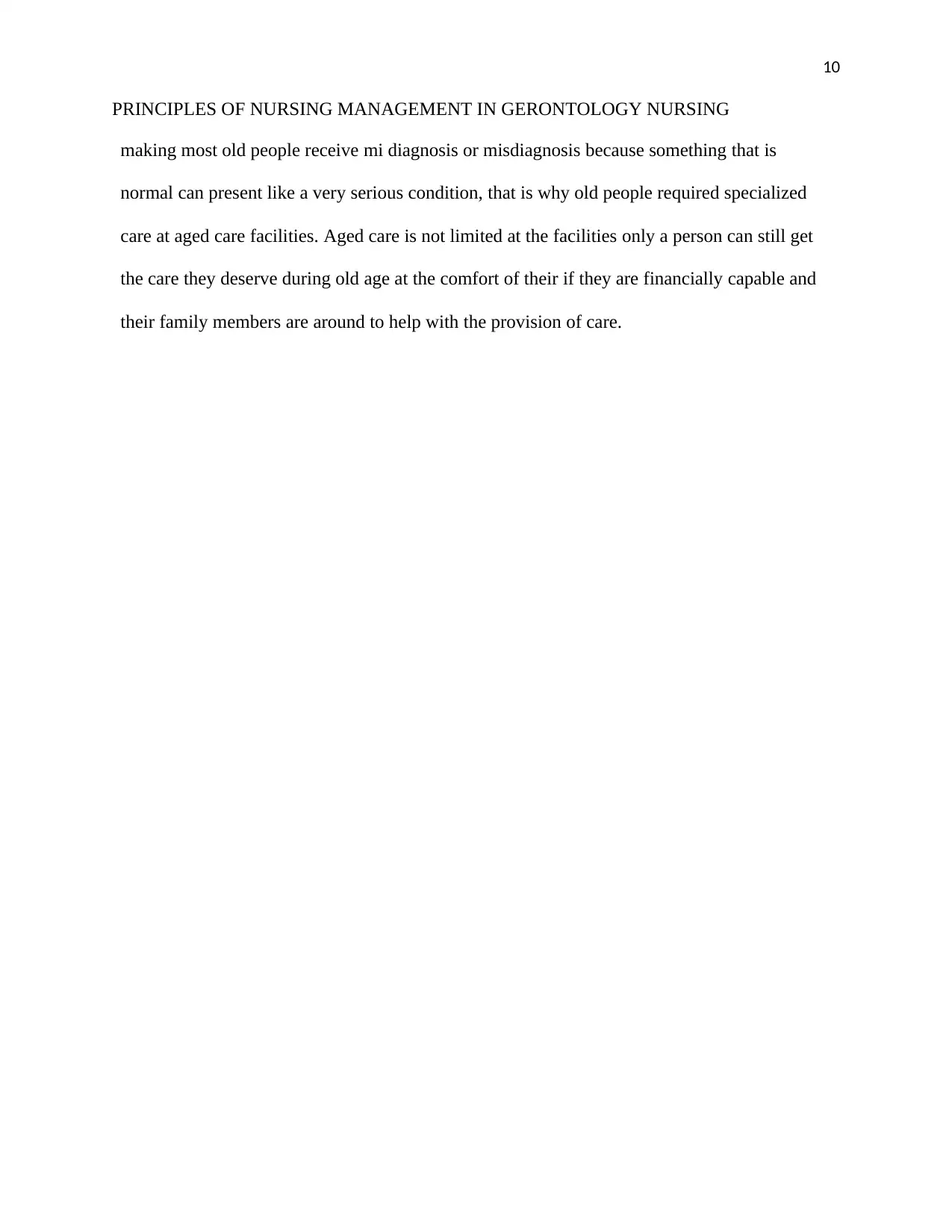
10
PRINCIPLES OF NURSING MANAGEMENT IN GERONTOLOGY NURSING
making most old people receive mi diagnosis or misdiagnosis because something that is
normal can present like a very serious condition, that is why old people required specialized
care at aged care facilities. Aged care is not limited at the facilities only a person can still get
the care they deserve during old age at the comfort of their if they are financially capable and
their family members are around to help with the provision of care.
PRINCIPLES OF NURSING MANAGEMENT IN GERONTOLOGY NURSING
making most old people receive mi diagnosis or misdiagnosis because something that is
normal can present like a very serious condition, that is why old people required specialized
care at aged care facilities. Aged care is not limited at the facilities only a person can still get
the care they deserve during old age at the comfort of their if they are financially capable and
their family members are around to help with the provision of care.
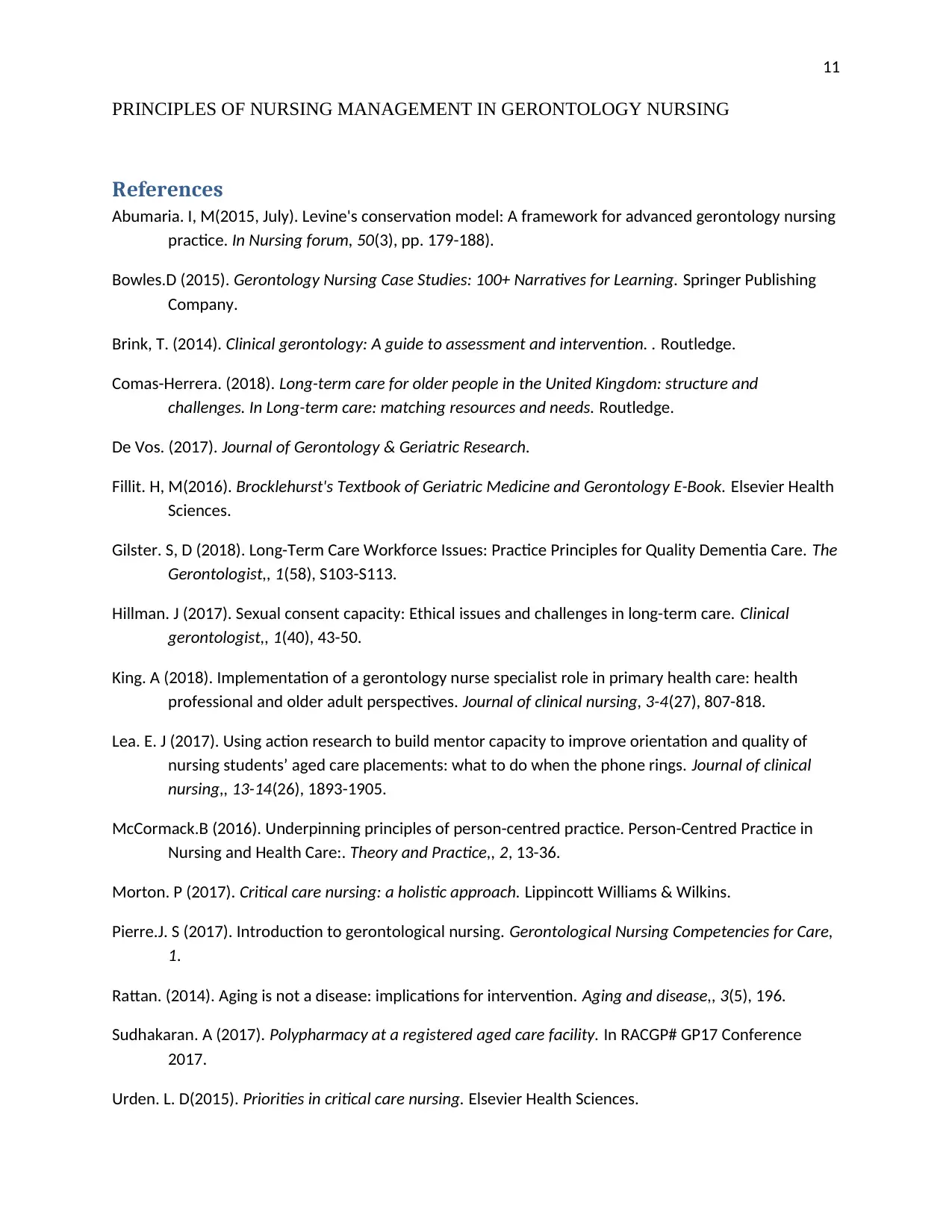
11
PRINCIPLES OF NURSING MANAGEMENT IN GERONTOLOGY NURSING
References
Abumaria. I, M(2015, July). Levine's conservation model: A framework for advanced gerontology nursing
practice. In Nursing forum, 50(3), pp. 179-188).
Bowles.D (2015). Gerontology Nursing Case Studies: 100+ Narratives for Learning. Springer Publishing
Company.
Brink, T. (2014). Clinical gerontology: A guide to assessment and intervention. . Routledge.
Comas-Herrera. (2018). Long-term care for older people in the United Kingdom: structure and
challenges. In Long-term care: matching resources and needs. Routledge.
De Vos. (2017). Journal of Gerontology & Geriatric Research.
Fillit. H, M(2016). Brocklehurst's Textbook of Geriatric Medicine and Gerontology E-Book. Elsevier Health
Sciences.
Gilster. S, D (2018). Long-Term Care Workforce Issues: Practice Principles for Quality Dementia Care. The
Gerontologist,, 1(58), S103-S113.
Hillman. J (2017). Sexual consent capacity: Ethical issues and challenges in long-term care. Clinical
gerontologist,, 1(40), 43-50.
King. A (2018). Implementation of a gerontology nurse specialist role in primary health care: health
professional and older adult perspectives. Journal of clinical nursing, 3-4(27), 807-818.
Lea. E. J (2017). Using action research to build mentor capacity to improve orientation and quality of
nursing students’ aged care placements: what to do when the phone rings. Journal of clinical
nursing,, 13-14(26), 1893-1905.
McCormack.B (2016). Underpinning principles of person-centred practice. Person-Centred Practice in
Nursing and Health Care:. Theory and Practice,, 2, 13-36.
Morton. P (2017). Critical care nursing: a holistic approach. Lippincott Williams & Wilkins.
Pierre.J. S (2017). Introduction to gerontological nursing. Gerontological Nursing Competencies for Care,
1.
Rattan. (2014). Aging is not a disease: implications for intervention. Aging and disease,, 3(5), 196.
Sudhakaran. A (2017). Polypharmacy at a registered aged care facility. In RACGP# GP17 Conference
2017.
Urden. L. D(2015). Priorities in critical care nursing. Elsevier Health Sciences.
PRINCIPLES OF NURSING MANAGEMENT IN GERONTOLOGY NURSING
References
Abumaria. I, M(2015, July). Levine's conservation model: A framework for advanced gerontology nursing
practice. In Nursing forum, 50(3), pp. 179-188).
Bowles.D (2015). Gerontology Nursing Case Studies: 100+ Narratives for Learning. Springer Publishing
Company.
Brink, T. (2014). Clinical gerontology: A guide to assessment and intervention. . Routledge.
Comas-Herrera. (2018). Long-term care for older people in the United Kingdom: structure and
challenges. In Long-term care: matching resources and needs. Routledge.
De Vos. (2017). Journal of Gerontology & Geriatric Research.
Fillit. H, M(2016). Brocklehurst's Textbook of Geriatric Medicine and Gerontology E-Book. Elsevier Health
Sciences.
Gilster. S, D (2018). Long-Term Care Workforce Issues: Practice Principles for Quality Dementia Care. The
Gerontologist,, 1(58), S103-S113.
Hillman. J (2017). Sexual consent capacity: Ethical issues and challenges in long-term care. Clinical
gerontologist,, 1(40), 43-50.
King. A (2018). Implementation of a gerontology nurse specialist role in primary health care: health
professional and older adult perspectives. Journal of clinical nursing, 3-4(27), 807-818.
Lea. E. J (2017). Using action research to build mentor capacity to improve orientation and quality of
nursing students’ aged care placements: what to do when the phone rings. Journal of clinical
nursing,, 13-14(26), 1893-1905.
McCormack.B (2016). Underpinning principles of person-centred practice. Person-Centred Practice in
Nursing and Health Care:. Theory and Practice,, 2, 13-36.
Morton. P (2017). Critical care nursing: a holistic approach. Lippincott Williams & Wilkins.
Pierre.J. S (2017). Introduction to gerontological nursing. Gerontological Nursing Competencies for Care,
1.
Rattan. (2014). Aging is not a disease: implications for intervention. Aging and disease,, 3(5), 196.
Sudhakaran. A (2017). Polypharmacy at a registered aged care facility. In RACGP# GP17 Conference
2017.
Urden. L. D(2015). Priorities in critical care nursing. Elsevier Health Sciences.
⊘ This is a preview!⊘
Do you want full access?
Subscribe today to unlock all pages.

Trusted by 1+ million students worldwide
1 out of 14
Related Documents
Your All-in-One AI-Powered Toolkit for Academic Success.
+13062052269
info@desklib.com
Available 24*7 on WhatsApp / Email
![[object Object]](/_next/static/media/star-bottom.7253800d.svg)
Unlock your academic potential
Copyright © 2020–2026 A2Z Services. All Rights Reserved. Developed and managed by ZUCOL.





